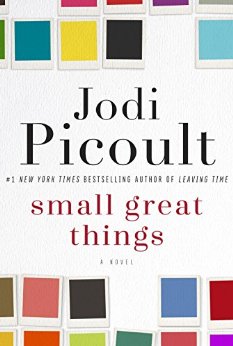
Small Great Things by Jodi Picoult (Ballatine. 2016. ISBN 9781444788013. This review refers to the Audible version of the book.)
I will likely incur the wrath of women’s book clubs across the world if and when they read this review. But here goes.
Because of the subject matter, racial discrimination in modern day America, I wanted to love this book. And, for the first quarter of the story, I was hooked. Picoult is a very fine wordsmith. However, at least in this effort, she falls flat as a researcher and storyteller. Here’s why.
The protagonist Ruth Jackson is a registered nurse of color who loses her nursing license because of an incident at the hospital she works in. The white parents of an infant, particularly the husband, Turk, express white supremacist views to a charge nurse, indicating that they do not want “those” people (African Americans like Ruth) touching their child. Inexplicably and despite having worked with Ruth for years, the charge nurse accedes to the couples’ racist desires. That’s something that, while it apparently did happen in Michigan on one occasion (Picoult cites that circumstance as the impetus behind her novel), it’s so highly unlikely and brazenly wrong, makes the story seem implausible. But since it did happen at least once in 21st century America, I’ll give the author a pass on this plot point.
Predictably, an emergency ensues where Ruth must make a choice: render aid to the infant or follow her superior’s order not to treat the child. The child dies and a few days later, Ruth receives a letter from the Connecticut State Board of Nursing that her license, according to author’s first rendition of the event, is revoked. As an attorney and a judge, this defect in basic research caused me pause. Having once represented a nurse addicted to pain medications who went before the Minnesota Nursing Board for a hearing on her license suspension (Picoult later changes the word used to describe Ruth’s punishment from license “revocation” to “suspension”), I was curious as to how a nursing license in Connecticut can be pulled without notice and a hearing, two fundamental principles of law. It can’t. One click on the Connecticut Board of Nursing’s website reveals that the process Picoult described, instant revocation of one’s nursing license by mail, doesn’t exist in Connecticut. This flaw isn’t fatal to the story but it caused suspicion that other aspects of the book might not be based in truth.
Then there is the arrest. For some unknown reason, the State of Connecticut decides to wait until 3:00am to serve an arrest warrant on a well respected African American registered nurse who doesn’t pose a danger to society and doesn’t pose a flight risk. The night arrest propels a scene where cops knock on Ruth’s door while she and her son are sleeping, and, hearing no answer, break down the door, toss Ruth and her teenage son in cuffs, and haul a middle aged registered nurse off to jail in her nightgown. Possible? Maybe in Alabama in 1920. In Connecticut in 2016? Highly unlikely. The motivation behind such emergent and clandestine behavior by the police, especially when it’s the result of collaboration with the prosecutor’s office and not the result of say, a traffic stop or an “at the scene arrest” where tension and fear are major factors and mistakes are often made by the police, is completely absent. Toss in the fact that, given the racially charged aspects of the case, no modern prosecutor in any jurisdiction, including the Old South, would likely seek an indictment or bring a charge against Ruth for any sort of criminal act, and the plot line (preparation and trial) that propels the story can’t pass the smell test.
I did like the handling of the white defense lawyer’s inner turmoil as she tries to represent Ruth during the trial process with the dignity Ruth deserves. Throughout the tale, Kennedy McQuarrie deals with her own white privilege and her understanding of her own prejudices and conclusory beliefs about African Americans as she tries to see things from Ruth’s perspective. She, in my mind, thinks and acts as many white Americans in her shoes would behave. Maybe because the author, a white, privileged woman, identifies closely with the character. But this attribute of believably is not enough to overcome other flaws in both the legal and theoretical plotting of this novel, as well crafted as the sentences may be. Turk (the white supremacist) and his wife end up coming off as cartoonish and gaudy in their antics, and the plot twist (won’t spoil it here) at the end of the story as it relates to them is tired and predictable even if borrowed from real life.
I get why book clubs, especially women’s book clubs, are reading this novel in droves. It does bring to the surface many, many tensions regarding racial interaction in the United States. And that, to my way of thinking, is a very good thing, something I attempted to do in a less in-your-face fashion in my first person novel, Esther’s Race. I only wish Picoult had spent more time on researching law and police procedure and crafting her story and less time seeking to produce an outline for a social science discussion.
3 stars out of 5. Readable by not a great read.
Peace.
Mark
PS For the record, my wife Rene’ disagrees with my assessment of the book. She has recommended it to her book club…I shall say no more about that!


